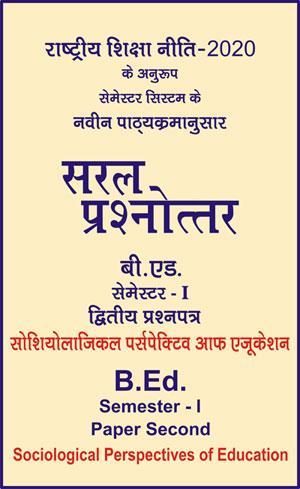|
बी एड - एम एड >> बी.एड. सेमेस्टर-1 प्रश्नपत्र-II - सोशियोलाजिकल पर्सपेक्टिव आफ एजूकेशन बी.एड. सेमेस्टर-1 प्रश्नपत्र-II - सोशियोलाजिकल पर्सपेक्टिव आफ एजूकेशनसरल प्रश्नोत्तर समूह
|
5 पाठक हैं |
|||||||
बी.एड. सेमेस्टर-1 प्रश्नपत्र-II - सोशियोलाजिकल पर्सपेक्टिव आफ एजूकेशन (अंग्रेजी भाषा मे)
Question- Education for democracy cannot succeed without democracy in education. Examine this statement and evaluating the present position in the context of India give your concrete and practical suggesting for improvement in the situation.
Ans.
Education for Democracy
The educational pattern may be cut other the interest of the many; although that ‘many’ may not participate broadly or directly in the exercise of sovereign power. In this instance the centre of education is ‘many’. There may be another instance, where education is not any many centred, but where two government too is of the many, by the many and the many, this combination augurs well for a “Many-Centred” Education Propelled by the many. This is the education approach to democracy. Democracy is the society which makes provision for the participation in the good of all its members on equal terms and which secures flexible adjustment of its institutions through interaction of the different forms of associated life” (John Dewey). According to Nehru, “The democratic method inevitable implies trying to understand the other party’s opinion, a certain give-and-take, and a certain adjustment to whatever the final decission, might be. But democracy, while it ensure free expression and freedom of thinking, also demands something. It demands unified action afterward. In demands acceptance of the decission taken." Democracy in education and national welfare :
- Provision of equal opportunities and consideration of individual difference.
- Universal and compulsory education.
- Free education.
- Adult education
- Child-Centred education.
- Individual attention method teaching.
- Maximum development of personality.
- Provision for social activities.
- Provision for student councils.
- Report for teachers.
- Participation in school administration
- Intelligence test for grouping and to avoid wastage.
- Healthcare of children.
- School as centres of national consciousness and International understanding.
- Cooperation between all agencies and components of education.
Democracy in various Aspects of Education Democracy and Aim of Education :
-
Development of Democratic Values : The success of democracy does not depend up legislative buildings and massive structures of parliament house, but it rests upon the quality of the citizen devoted to democratic values. As such, the Prime aim of democratic education is to promote in children a sense of devotion to democratic values.
-
Development of worthy interest : The second aim of democratic education is to develop useful and worthy interest in children. Interest from character and in rich a childs life. Hence, the famous educationist. Herbert insisted upon the fullest development diverse interest.
-
Development of vocational efficiency : For the success of democratic setup, economic contentment of citizen is must an indigent and poor person can be a victim of all binds of allurements inducements and exploitation by the resourceful and the powerful.
-
Development of sound habits : The fourth aim of democratic education is to develop sound habits in children. Habits are the source of good or bad conduct. Hence, education should develop good habits in children from the very beginning to make democrat a successful venture."
-
Development of thinking power : The fifth aim of democracy education is to develop thinking power of children. Infact children of today are citizen of tomorrow when they will be confronted with all kinds of problems in political, social and economic, fields education should develop in children the capacity to think clearly and take decisions confidently.
-
Development of social outlook : Development of social outlook is the six important aim of democratic education. This aim emphasises the fact that children should be imbued with the sense that they are the integral parts of society. The welfare of which should be their ideal, not only this, they should learn to live and die for the nation education should develop this sense of service and sacrifice making them learn the sacredness of obligation and duties for the welfare of the nation to which they belong.
-
Development of harmonious personality : The seventh aim of democratic education is to develop the individuality of a child into balanced and harmonious personality. In the modern world of strife stress and strain, a balanced and harmonious, personality only can seek and find adjustment with surroundings. Hence, education should develop character, dynamism and social out look for this purpose.
-
Development of leadership : Democratic education should develop leadership qualities in children, today’s children are not only tomorrow’s leader in various walks of national life.
-
National and International feeling : Education should aim at develop a sense of ordent nationalism and devotion to and understanding of International matter as the two are supplementary the International understanding should stand high on the shoulders of nationalism to attain necessary height and perspective.
Democracy and Curriculum
- Diversified.
- Advancement of social aims.
- Flexible.
- Emphases on local needs.
- Provision of vocation needs.
- Emphases on activity.
- Place for leisure hour activities.
Another important thing to bear in mind is that the curriculum should develop desirable social attitudes and free the members of society from all kinds of prejudices, Dewey has rightly emphasised that “education must have a tendency, if it is education to form attitudes. The tendency to form attitudes which will express themselves in intelligent social action is something very different from indoctrination.
In this way, it quite obvious that the curriculum for democratic education has to develop desirable attitudes and bring about emotional integration among all section of society.”
|
|||||














